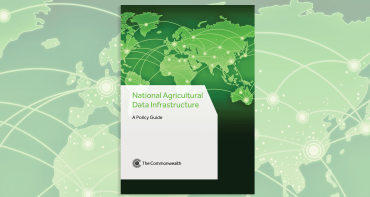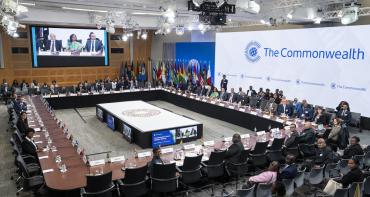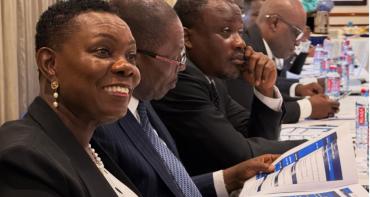Plans for a first national inquiry into violence in Samoa were discussed by the country’s National Human Rights Institution, the Office of the Ombudsman at this week’s Commonwealth Women’s Affairs Ministers meeting in Apia.

Plans for a first national inquiry into violence in Samoa were discussed by the country’s National Human Rights Institution, the Office of the Ombudsman at this week’s Commonwealth Women’s Affairs Ministers meeting in Apia. Investigating the impact of violence as a systemic pattern of human rights violation, the inquiry will help to strengthen the systems in place to protect the human rights of the Samoan people.
Samoa’s Ombudsman, Maiava Iulai Toma, said: “One of the biggest challenges that I foresee is how we are going to collect evidence via public hearings in a culturally-sensitive and safe way. We need to be mindful of not putting survivors of violence in any more danger if they decide to come forward and tell us their stories.”
The Ombudsman discussed the rationale for conducting the inquiry, which the Commonwealth Secretariat will provide technical assistance for, and its intention to start a national dialogue on the issue of violence and mobilizing all levels of society in Samoa, including traditional and religious leaders.
Commonwealth Secretary-General, Patricia Scotland, opened the side event, highlighting the pivotal importance of eliminating violence against women and girls in the Commonwealth. She said: “Violence poses a serious challenge to the development and human rights of families. We all have a role to play in challenging this evil at the local, national, regional and international levels, national human rights institutions, such as the Ombudsman of Samoa have a vital role to play in the protection and promotion of the human rights of women and girls nationally”.
In 2014, the Ombudsman undertook the first ever comprehensive review of human rights in the country. The report confirmed data collected by the Samoa Family Health and Safety Study in 2007 indicating that almost half of women surveyed (46.4%) aged 15 to 49 reported experiencing physical, emotional or sexual violence by an intimate partner. The epidemic rates of domestic violence prompted the ombudsman’s office to consider conducting its first national inquiry on this topic.
Former UN special rapporteur on violence against women and girls, Professor Rashida Manjoo recommended that the inquiry process pays particular attention to the voices of women and girls.
At the event, Professor Manjoo said: “With family violence being a ‘hidden/private’ issue in many contexts, it is important to use a methodology that allows for women to provide a ‘narrative/story’ of their experiences - in a safe, confidential and non-judgemental environment”.
The importance of listening to women’s voices was underscored by Siliniu Lina Chang, President of the Samoa Victim Support Group. This community based organisation provides essential services to women survivors of violence, including advice, legal and psychosocial support and solidarity.
A survivor of harrowing domestic violence over many years and beneficiary of the Samoa Victim Support Group spoke poignantly about the abuse she endured. Violence has blighted her life and institutional responses failed to deliver accountability, safety and healing. Speaking at the event, she asked: “Where are my human rights? Where is the protection for my children and I?”.
Participants attending the side event which included senior officials of most of the relevant government institutions who carry a remit for protection and redress, agreed that the inquiry will be an opportunity to take stock of the current prevalence levels and to make this issue the subject of public national debate.
Established in 2013, the ombudsman of Samoa has already been awarded ‘A’ grade accreditation status by the Global Alliance of National Human Rights Institutions (GANHRI). This indicates full compliance with the Paris Principles which set out the international minimum standards for national human rights institutions.
The Commonwealth Secretariat will continue to provide technical assistance to the Ombudsman during the life span of the inquiry.
Media contacts:
Communications lead in the UK:
Kathleen Prior, Communications Officer at the Commonwealth Secretariat
T. +44 7587 657 269 [email protected]
Communications lead in Samoa:
Sharon Bhagwan Rolls, Executive Producer-Director at femLINKpacific [email protected]
Find out more online: http://thecommonwealth.org/11WAMM
Photos are available at https://www.flickr.com/photos/comsec/albums/72157673398639856



